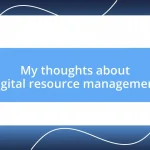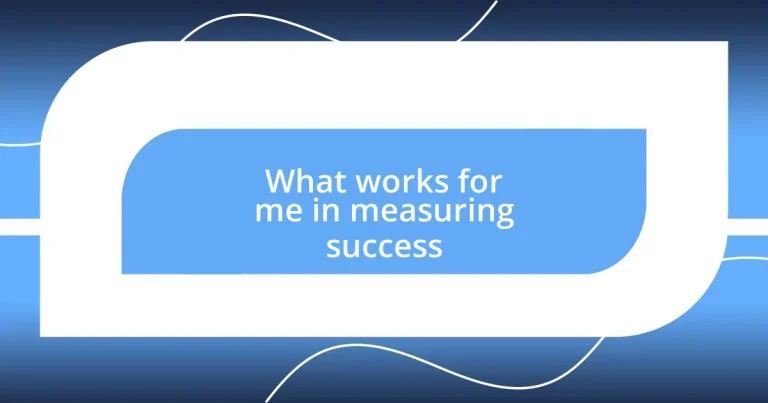Key takeaways:
- Defining personal success is a unique journey that prioritizes individual values and fulfillment over societal standards.
- Tracking important metrics, such as personal fulfillment and work-life balance, enhances the understanding of success beyond traditional measures like income.
- Adapting strategies and celebrating milestones are essential for maintaining motivation and acknowledging progress throughout the journey of success.
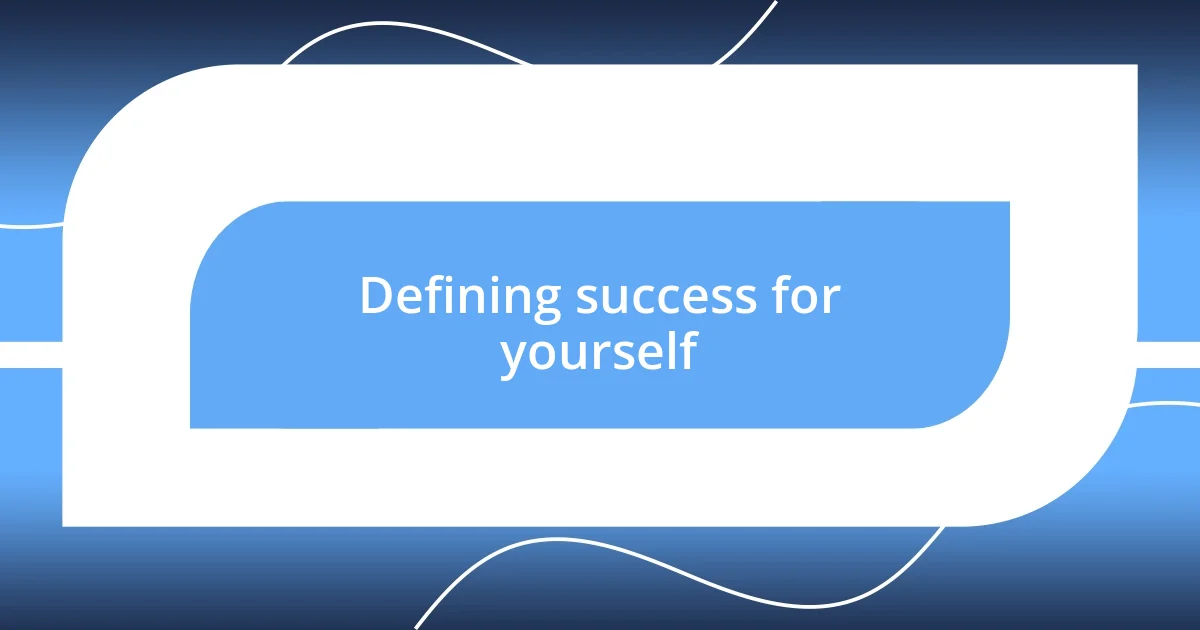
Defining success for yourself
Defining success for yourself is an incredibly personal journey. I remember sitting in my tiny apartment after a long day, feeling as though I was stuck in a rut. It made me question what success truly meant to me beyond conventional measures like wealth or status. Was it fulfillment, happiness, or perhaps having meaningful relationships in my life?
Sometimes, the societal standards of success can feel overwhelming. I once fell into the trap of comparing my milestones to my friends’ achievements. But deep down, I knew that real success is about setting goals that resonate with my values and passions, not just fitting into a mold. It’s essential to ask yourself: what brings you joy and a sense of accomplishment?
I’ve learned that defining success is an ongoing process, often changing with life’s various chapters. There were times when my definition shifted from career-driven goals to a focus on personal growth and well-being. It’s about recognizing what feels right in your heart and allowing that to guide your path forward. What if success for you is simply finding balance in life? Fostering that personal connection to your definition is vital.

Key metrics to track success
Tracking success requires clarity on the key metrics that matter to you. Through my journey, I realized that measuring success isn’t just about number crunching; it’s about understanding what those numbers represent. For instance, I used to focus solely on my income as a measure of success. However, I soon learned that metrics reflecting personal satisfaction and growth played a crucial role in my overall happiness.
Here are some essential metrics that I’ve found helpful in evaluating my success:
- Personal Fulfillment Index: Assess daily moments that bring joy, like hobbies or connections.
- Goal Completion Rate: Track the percentage of personal and professional goals achieved.
- Work-Life Balance: Evaluate time spent on work versus personal life; isolation can signal misalignment.
- Skill Development: Monitor new skills acquired each year—these can lead to enriching experiences.
- Relationship Health: Reflect on the quality of your relationships; strong bonds often coincide with personal satisfaction.
By focusing on these metrics, I’ve discovered a more profound understanding of what success means to me, allowing me to celebrate progress that resonates with my aspirations.
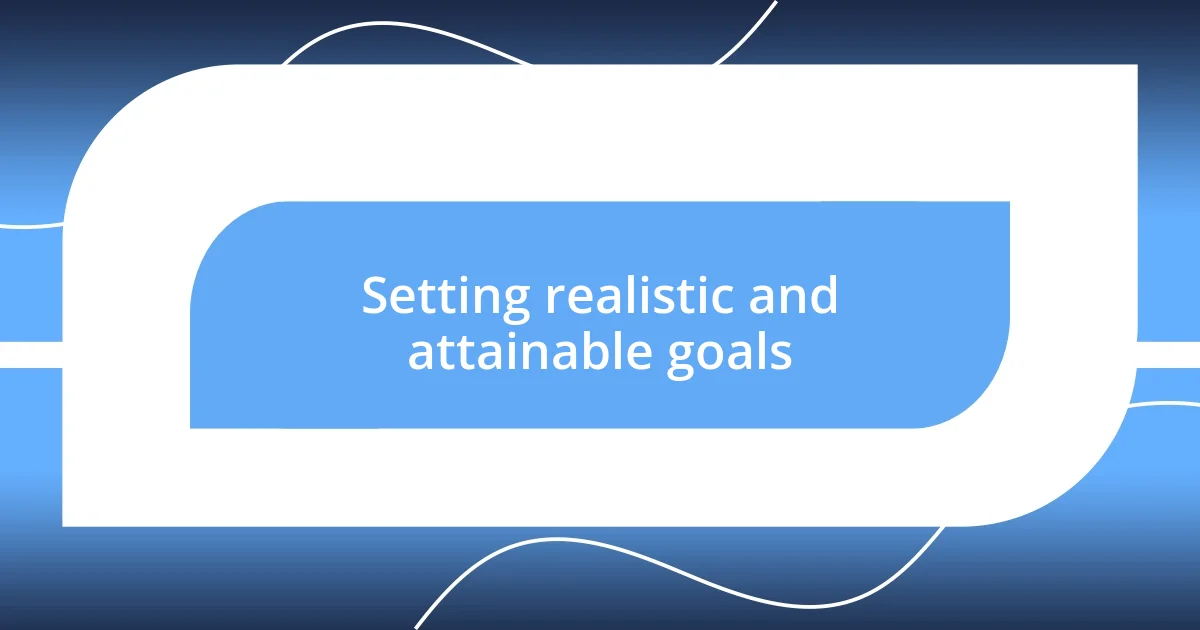
Setting realistic and attainable goals
Setting realistic and attainable goals is crucial for anyone looking to measure their success effectively. Early in my career, I set lofty targets that were simply out of reach. I quickly realized that when goals are too ambitious, they can lead to feelings of failure. By starting with small, achievable steps, I harnessed a sense of accomplishment that motivated me to keep progressing.
I once aimed to double my productivity in a month, an unrealistic expectation that left me feeling overwhelmed. Instead, by breaking this goal down into bite-sized, actionable tasks, I found that gradually increasing my daily output was much more manageable. This approach not only helped me stay focused but also enhanced my confidence as I celebrated each little victory along the way.
To put it simply, setting realistic goals allows for growth at a sustainable pace. I’ve learned that it’s about progression, not perfection. Each small goal achieved serves as a building block for more significant ambitions, ultimately leading to a more fulfilling measure of success that you can genuinely feel proud of.
| Characteristics | Realistic Goals | Unrealistic Goals |
|---|---|---|
| Timeframe | Short-term, specific deadlines | Long-term, vague timelines |
| Outcome | Achievable with effort | Often leads to frustration |
| Motivation | Encourages ongoing pursuit | May result in burnout |
| Flexibility | Can be adjusted as needed | Rigid, less adaptable |
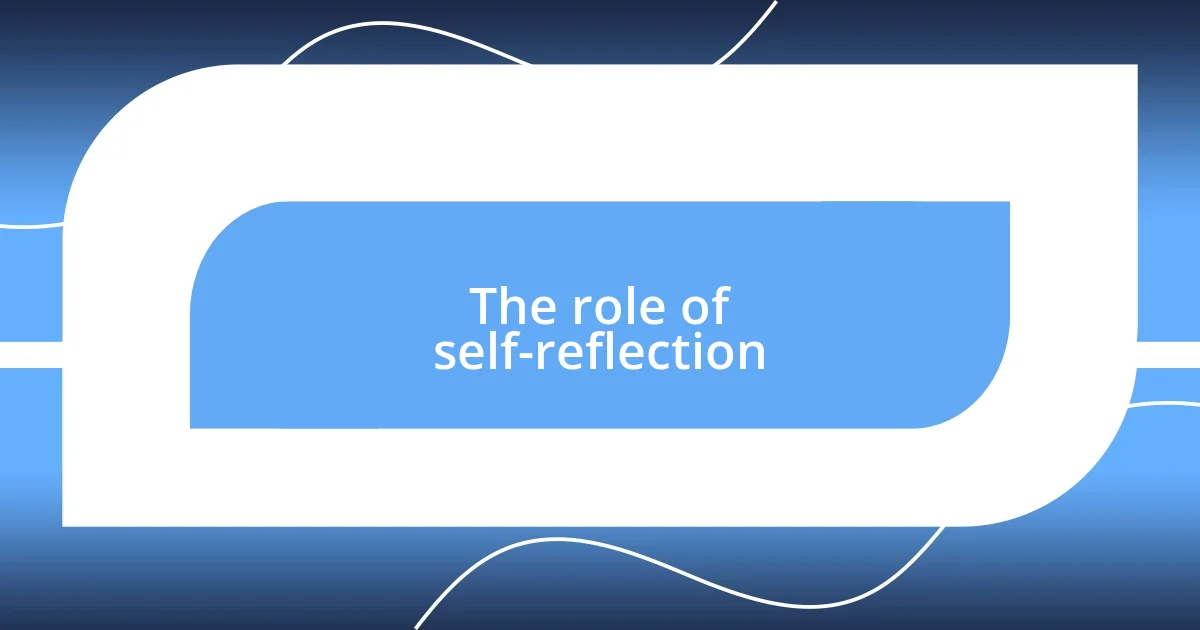
The role of self-reflection
Self-reflection plays a pivotal role in my understanding of success. It allows me to pause and ask myself questions like, “What truly makes me happy?” or “Am I moving closer to my goals?” These moments of introspection have revealed that success isn’t merely about accomplishments or numbers; it’s also about feelings—the joy of learning or the satisfaction of nurturing relationships.
I remember a period when I was consumed by work, checking off tasks without considering how they aligned with my values. After some honest self-reflection, I recognized that while I was ticking boxes, I was neglecting the things that brought me joy. This realization was eye-opening; I learned to adjust my daily routines to incorporate activities that recharged my spirit, like spending quality time with loved ones or dedicating time to my hobbies.
Looking back, I can honestly say that self-reflection has been life-changing. It has taught me that measuring success isn’t just about tracking metrics but about tuning in to my emotional well-being and personal growth. How often do you take a step back to reflect on your journey? It’s in those quieter moments that I find the clearest answers, guiding me toward a richer, more fulfilling perspective of success.
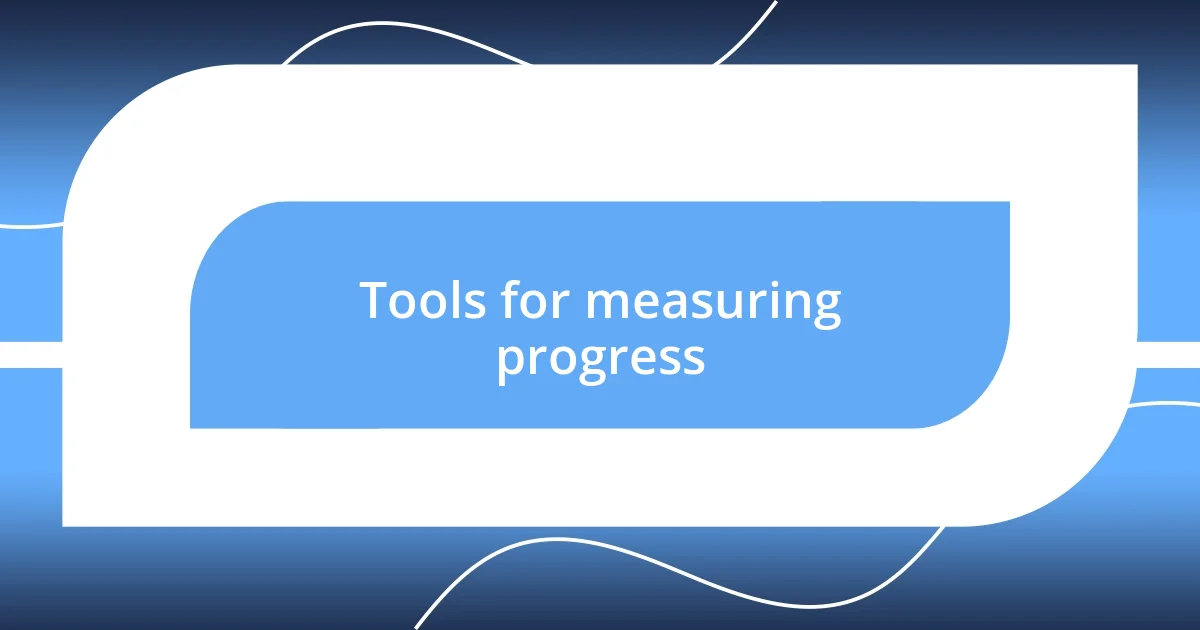
Tools for measuring progress
When it comes to measuring progress, I’ve found that specific tools can significantly enhance my understanding of where I stand. One of my favorites is a simple progress journal. Each week, I jot down what I accomplished, what challenges I faced, and how I felt. This physical act of writing helps me to visually track my journey and serves as a reminder of the small steps I’ve taken. Have you ever tried journaling? It’s remarkable how it can illuminate patterns in your work and emotional state that you might otherwise overlook.
Another valuable tool for me is setting up digital milestone trackers. I often use apps that break my broader goals into smaller, measurable milestones. For instance, when I was learning a new skill, I set a timeline with specific checkpoints. I celebrated each milestone, which not only kept me accountable but heightened my excitement and motivation. The satisfaction of reaching each checkpoint often felt like taking a step toward an exhilarating adventure—have you experienced that rush when you see progress in real time?
I also can’t emphasize enough the importance of feedback tools. Whether it’s asking for input from colleagues or utilizing self-assessment quizzes, feedback gives me insights that self-reflection alone can’t capture. Recently, I asked a trusted mentor to review my work regularly. This not only helped me gauge my progress but also made me feel supported in my endeavors. Would it be helpful for you to seek feedback? I’ve found it can provide perspectives that guide you toward continuous improvement and success.
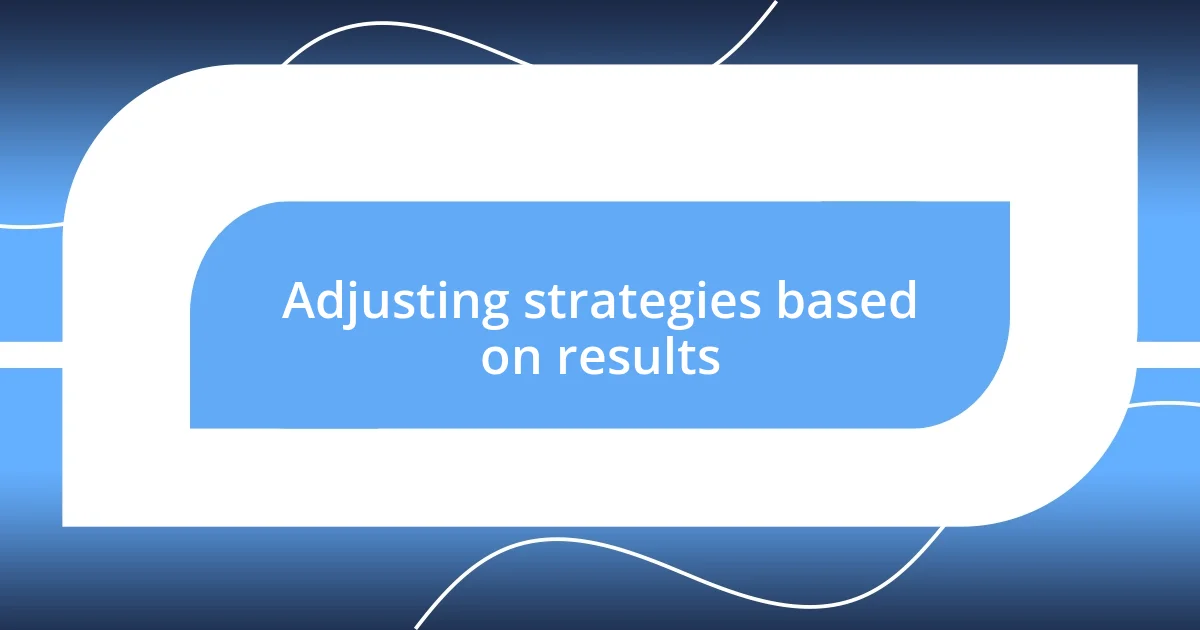
Adjusting strategies based on results
Adjusting strategies based on results is essential in my journey. There was a time when I embarked on a fitness routine, convinced that following a strict schedule would yield results. However, after several weeks, I noticed my energy levels waning and my enthusiasm dwindling. It was clear that the approach was not aligned with my needs, so I took a step back and reassessed. I pivoted to a more flexible routine that included activities I genuinely enjoyed, like hiking and dance classes. This not only revitalized my passion but also led to better results without that dreaded burnout. Have you ever felt the difference when you switch to a strategy that resonates more with you?
The learning curve in adjusting strategies can be tricky but rewarding. I recall a time in my professional life when I was working on a project that initially seemed promising. After a few months, I realized my strategy wasn’t yielding the expected outcomes, leaving me frustrated and overwhelmed. Instead of pushing through, I made the conscious decision to gather feedback from my team. This collaboration not only opened my eyes to alternative approaches but allowed me to incorporate diverse perspectives that reignited my passion for the project. Isn’t it fascinating how collaborating can lead to breakthroughs we might miss on our own?
Monitoring results has consistently reminded me that success is not a straight line; it’s often a winding path. For instance, when I tried to launch a side business, I meticulously tracked my initial sales numbers, only to find they weren’t as strong as I had hoped. It was disheartening, but instead of wallowing in disappointment, I revisited my marketing strategy, experimenting with social media campaigns tailored to my audience. Over time, I saw an increase in engagement and sales, proving that adjustments based on insightful reflection can lead to unexpected outcomes. How do you adjust your course when faced with unexpected results?
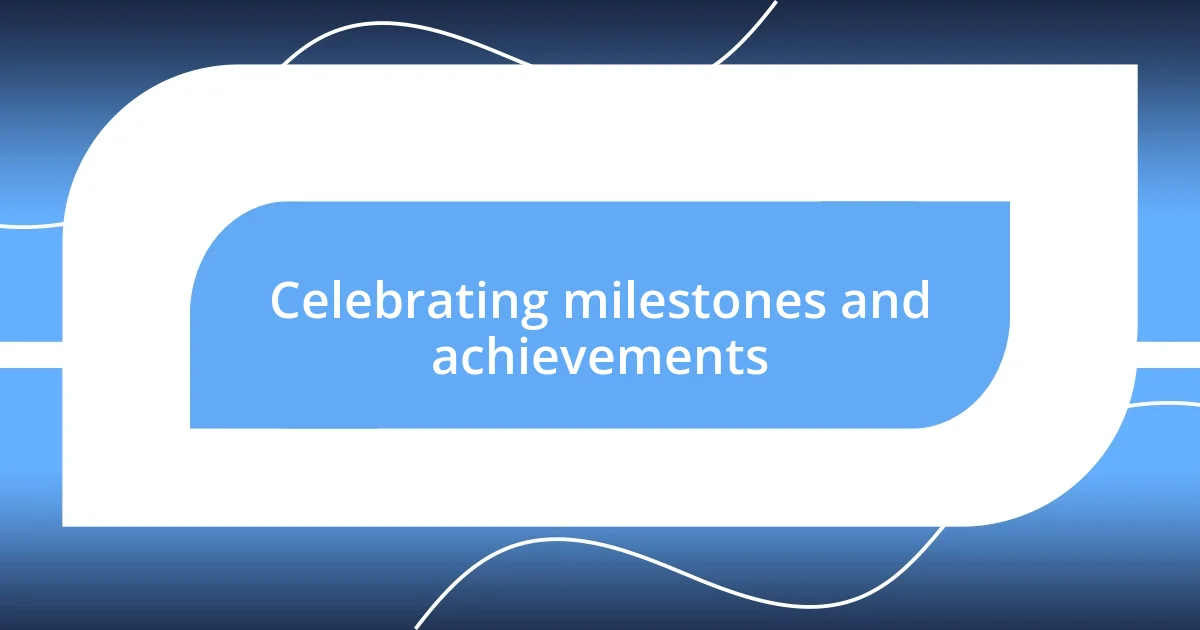
Celebrating milestones and achievements
Celebrating milestones and achievements is something I truly cherish along my journey. For instance, when I completed my first significant project, I decided to indulge in a little treat—a delicious dinner at my favorite restaurant. That moment not only marked the completion of a task but also reinforced the value of hard work and commitment. Have you ever celebrated a small win and felt the weight of the world lift off your shoulders?
I also love incorporating meaningful rituals into my celebrations. I remember after landing a promotion at work; I gathered close friends to share stories and laughs over a cozy gathering. It wasn’t just about the new title; it was an opportunity to reflect on the journey and the support I received from those around me. How do you acknowledge your achievements? Sometimes, sharing that joy can amplify the satisfaction.
On occasion, I create visual reminders of my accomplishments. A few years ago, I developed a vision board filled with photos and quotes that illustrated my goals. Each time I ticked off an achievement, I added a little celebratory sticker or note next to it. This colorful display became a vibrant testament to my progress over time. Have you ever considered creating something similar? It’s amazing how visualizing success can keep you motivated and inspired.
